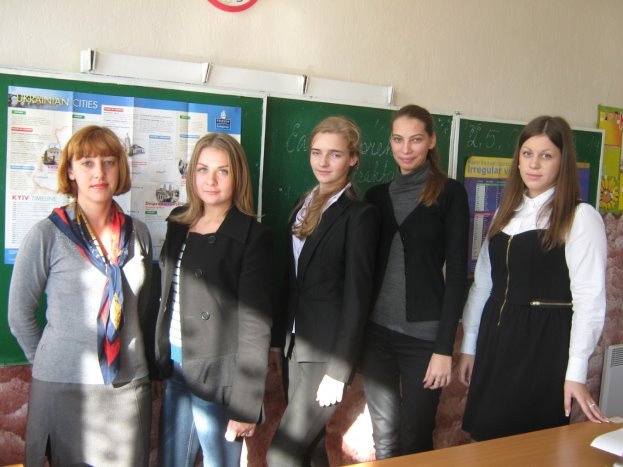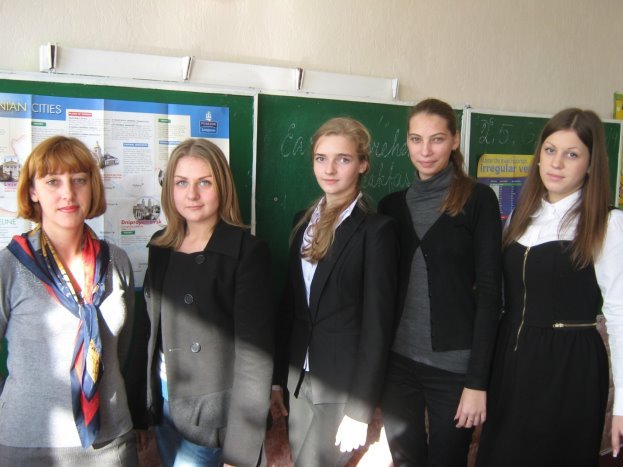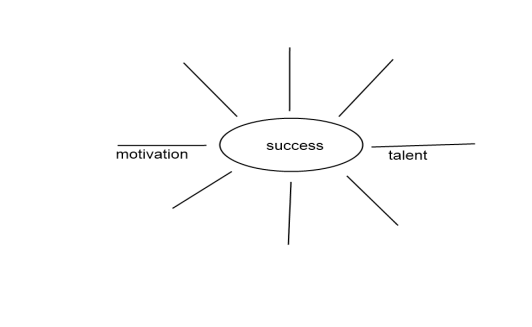Урок. Успiх та його складники.


Урок «Успіх та його складові» 10 клас
Цілі уроку:
-розвивати навички діалогічного мовлення на рівні розширеної дискусії;
-активізувати вивчений лексичний матеріал;
-розвивати навички робити повідомлення на основі мовленнєвої ситуації,обґрунтовуючи свої думки;
-розширювати загальний світогляд;
-стимулювати уяву.
Обладнання:Students’ Book “Real Life”,магнітофон,диск,картки з завданнями,постери з ключовими виразами,мікрофони.
Хід уроку:
1. T. Greeting.
T. Good morning! I’m glad to see you! How are you? Today we’ll speak about success and successful people. We are going to discuss which factors decide success using new quotations. We’ll have the interviews with imaginary celebrities. Let’s start!
2. Warming up.
T. Complete the mind map adding as many things needed to be a success as you can.

3. Refreshing vocabulary.
1) T. Sort out the things given in the box into the corresponding columns of the table below. The first one is done for you.
Natural talent, social network, hard work, challenge, motivation, dedication, ambition, knowledge, inspiration, self-confidence, sacrifices, appearance, money, discipline, luck.
If you want to succeed in life…
Important Unimportant Neutral
Natural talent
2) T. Explain your choice for each column. Follow the example.
Example: I think that natural talent is very important if you want to succeed in life because, on the one hand, you know your abilities and you can develop them, on the other hand, it’s easier to achieve your aim.
3) T. Answer the following questions and explain your reasons:
1. Do all people want to be successful?
2. What does success mean to you?
3. Is your family successful?
4. What successful people do you know? What are they famous for?
5. What are you ready to sacrifice to achieve your aim?
6. What factors decide success, e.g. talent, luck, hard work?
4. Reading and developing of the oral speech habits.
1) T. You are going to read the text about Malcolm Gladwell’s theory.
In his book ‘Outliers’-The Story of Success, author, Malcolm Gladwell, has come up with a theory that claims is true in every case. He says that the secret of success is simply many hours of hard work. He has calculated exactly how many hours work you need to do in order to become ‘the best’ in your field: 10.000 hours apparently or about four hours a day for ten years. Without this kind of determination and hard work you probably won’t reach the top, regardless of your talent.
Researchers looked at violin players in a music school to test this theory. Teachers put the players into three groups: average players in group C, good players in group B, and outstanding players in group A. It turned out that all the players in group A had done around 10.000 hours of practice in their lifetime. The good players had done around 6.000hours and the average players only 4.000hours. However, all the players had entered the school with similar levels of ability.
But surely there are exceptions to this rule? Mozart, for example, is always considered a ‘born genius’. He performed in public at the age of four and by six, he had composed several pieces. Surely his success was down to natural talent, not hard work? In fact, Gladwell argues, Mozart had a very strict father who made him practice for hours each day from an early age. And the music that Mozart composed when he was six wasn’t outstanding. Mozart wrote his first real masterpiece when he was twenty-one. By that time, he’d done at least 10.000hours of practice and had ‘become’ a genius.
Talent, argues Gladwell is nothing without hard work. So next time you dream of scoring the winning goal in the World Cup or winning an Oscar, ask yourself this question: are you really prepared to put in the hours necessary to achieve your goal?
2) Are the statements true or false?
A) Gladwell knows the secret of success.
B) Accoding to the theory you don’t need any talent.
C) It’s difficult to calculate the hours of work.
D) Mozart was an exception to his theory.
E) Mozart wrote his masterpiece at the age of six.
F) Gladwell won an Oscar.
G) You don’t need to work every day.
3) Work in groups. Ask and answer the questions about the text.
4) Make up short discussions in groups:
Do you agree or disagree with this theory?
-In my opinion…
-To my mind…
-The way I see it…
-The main reason is…
-If you ask me…
(When they have finished speaking, elicit ideas from different groups and open up the discussion with the class. Try to involve as many students as possible in the discussion by asking others if they agree or disagree.)
5. Developing of the listening habits.
Predicting a story… Is Luck Important?
1).T. dictates or writes the following questions on the board and asks to leave a blank line after each question.
1. What was the salesman selling?
2. Where was he?
3. What did he do?
4. What did he promise?
5. What did the customer say or do?
2). T. Let’s work in pairs. Think of a possible answer for each question. The five sentences should form a storyline.
3). T. Read, please, your suggested answers to the class.
4). T. Now we’ll listen to the story and see whose version is the closest.
Story
One day a man selling vacuum cleaners decided to go out into the country.
After driving for some time, he came across a remote farmhouse.
He knocked at the door and the farmer’s wife appeared.
“Good morning, madam, “said the salesman, “I’m going to show you something you’ll never forget.”
Before she could answer, he threw a bag of dirt onto her clean floor.
“Now,” he went on, “I promise you that if this latest model doesn’t pick up every bit of dust, I’ll eat it.”
The farmer’s wife disappeared into the kitchen and after a few moments came rushing back.
“Here’s a spoon,” she said, “we haven’t got any electricity!”
6. Developing of the oral habits.
1). T. Write down, please some quotations into your vocabularies.
-‘Success is often about being in the right place at the right time’.
-‘If you believe in yourself , you can achieve anything’.
-‘Genius is one percent inspiration and ninety-nine percent perspiration’.
-‘Behind every great man there is a great woman.’
-‘It’s not what you know in life that makes you successful, it’s who you know.’
2). T. Work in pairs, put the quotations in the order of their importance as the factors that decide success. Be ready to prove your choice. Can you rephrase them?
Pair Choice
1.-
2.-
3.-
4.-
5.-
3). T. Think of the famous successful people. Speak about one of them using the quotations that fit him/her.
7. T. Let’s play the game ‘Who am I?’ . One student thinks of a famous person. Others can ask him/her twenty general questions to guess who it is. The student will only answer ‘yes’ or ‘no’ to the questions, the questions must be grammatically correct. The student who guesses correctly thinks of the next famous person.
8. Developing of the dialogical speech.
Making up the interview.
1). T. Work in pairs.
The task for student A.: Imagine you’re a successful person. You are going to give an interview to a journalist.
Write notes about these things:
-the biography;
-what made you famous;
-the projects at the moment;
-the plans for future.
The task for student B.: Imagine you’re a journalist. You are going to take an interview of a famous person.
Use these expressions:
1). Can I ask you some questions, please?
2). To start with, can you tell us something about…
3). A couple more questions.
4). You made your first film(released your first album…) in …,didn’t you?
5). Can you explain that…?
2). T. Act out the interview.
9. Summing up.
T. So, our lesson is nearly over. Do you like it? What types of activity did you like best? Would you like to be a successful person? I think you would. Your marks are…
10. Home assignment.
T. Your task for the next lesson will be to write a composition: “ What is the secret that you need in order to be successful?”
Кулєшова О.О.
Колегіум №16
м.Дніпродзержинськ
обл.Дніпропетровська

про публікацію авторської розробки
Додати розробку
